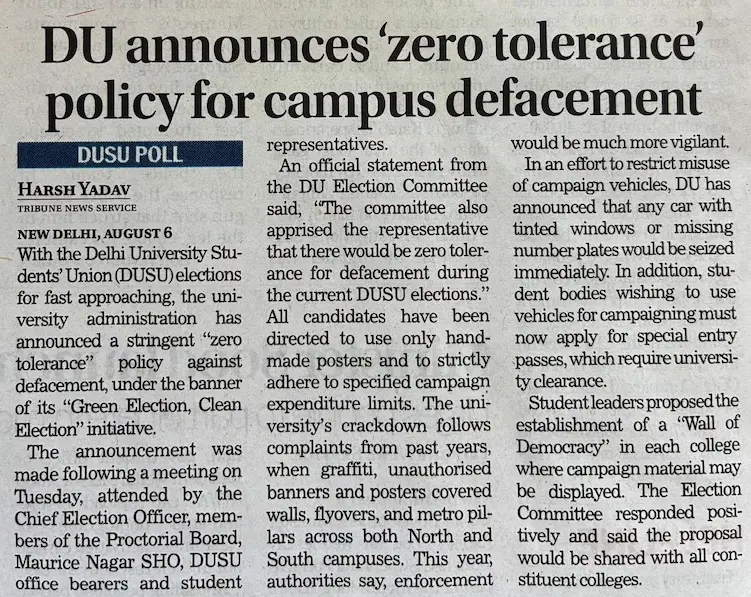
Delhi University students protest ₹1 lakh election bond, calling it unfair and undemocratic
What Is the ₹1 Lakh Bond Rule?
Delhi University’s ₹1 Lakh Bond Rule – Delhi University has introduced a new rule for student elections. Anyone who wants to contest in the Delhi University Students’ Union (DUSU) elections must now sign a ₹1 lakh bond. This bond acts like a security deposit. If the candidate or their supporters damage university property during campaigning, like putting up posters or graffiti, the bond money can be taken by the university.
The university says this rule will help stop defacement of public property, which has been a problem in past elections. Last year, the Delhi High Court even paused election results until all posters and banners were removed from campus walls.
But many students and leaders are not happy with this new rule. They say it is unfair, especially for students who come from poor or middle-class families. They believe it will stop many students from participating in elections, which goes against the idea of equal opportunity and democracy.
Student Unions Unite in Protest
In a rare show of unity, major student groups at Delhi University have come together to oppose the bond rule. These include:
- ABVP (Akhil Bharatiya Vidyarthi Parishad)
- NSUI (National Students’ Union of India)
- AISA (All India Students Association)
- SFI (Students’ Federation of India)
These groups usually have different political views, but this time they all agree: the ₹1 lakh bond is exclusionary and undemocratic. They held a joint protest at the Arts Faculty of Delhi University, with students from colleges like Ramjas, Hindu, Kirori Mal, and Miranda House joining in.
Student leaders said the bond would only allow rich students to contest elections, while ordinary students would be left out. They also pointed out that the Lyngdoh Committee, which sets rules for student elections, has capped election spending at just ₹5,000. So asking for a ₹1 lakh bond doesn’t make sense.
ABVP’s Delhi state secretary, Sarthak Sharma, warned that if the university doesn’t cancel the bond rule, the protest will grow “from the streets to the courts”.
Legal Action and Public Reaction
The protest isn’t just happening on campus. Some student groups have already taken the matter to court. AISA and SFI have filed petitions in the Delhi High Court, asking for the bond rule to be cancelled. They argue that the rule goes against the Lyngdoh Committee’s guidelines and limits democratic participation.
Students and alumni across India are also speaking out on social media. Many say the bond is a way to silence student voices, especially those from marginalized communities. Others worry that this rule could set a bad example for other universities.
Delhi University officials say the bond is meant to protect public property and encourage responsible campaigning. They also clarified that students don’t have to pay the ₹1 lakh upfront, a guardian or relative can provide a bank guarantee instead. But student leaders say this still creates a financial barrier for many.
Why This Matters for Campus Democracy
Student elections are more than just a vote, they are a way for young people to learn about democracy, leadership, and public service. Many famous politicians and activists started their journey in student unions. That’s why it’s important that these elections are open to everyone, not just those who can afford it.
The ₹1 lakh bond rule has sparked a serious debate about access, fairness, and representation. If only wealthy students can contest, then the student union may not reflect the voices of all students. This could lead to less diversity in leadership and fewer chances for real change on campus.
As the DUSU elections approach on September 18, all eyes are on Delhi University. Will the administration listen to the students and withdraw the bond rule? Or will the protests and court cases continue?
Final Thoughts
The fight over the ₹1 lakh bond is not just about money, it’s about equal rights and democratic values. By standing together, student unions are sending a strong message: every student deserves a chance to lead, no matter their background. As the movement grows, it reminds us that unity and courage can challenge even the toughest rules.
Historic Honour Golden Legacy in Metal: ₹75 Coin Marks IIT Kharagpur’s 75-Year Journey
Stay informed with the latest news and updates – only on Rapido Updates.